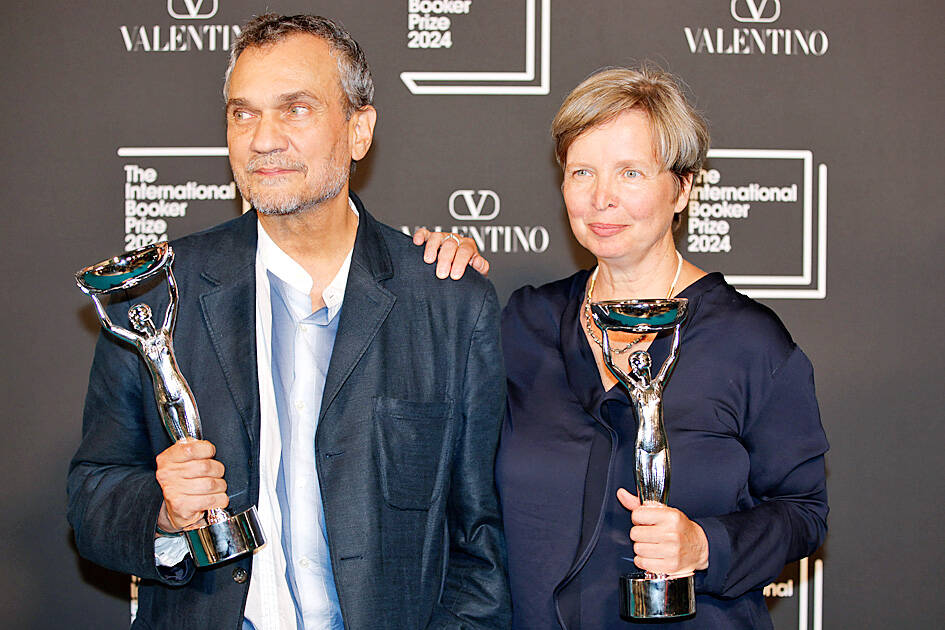German author Jenny Erpenbeck and translator Michael Hofmann on Tuesday won the International Booker Prize for fiction for Kairos, the story of a tangled love affair during the final years of the German Democratic Republic (GDR), or East Germany.
Erpenbeck said she hoped the book would help readers learn there was more to life in the now-vanished communist country than depicted in The Lives of Others, the Academy Award-winning 2006 film about pervasive state surveillance in the 1980s.
“The only thing that everybody knows is that they had a wall, they were terrorizing everyone with the Stasi, and that’s it,” she said. “That is not all there is.”

Photo: EPA-EFE
Kairos traces an affair from utopian beginning to bitter end, and draws parallels between personal lives and the life of the state.
The book beat five other finalists, chosen from 149 submitted novels, for the prize, which recognizes fiction works that have been translated into English and published in the UK or Ireland. The £50,000 (US$63,611) in prize money is divided between author and translator.
Canadian broadcaster Eleanor Wachtel, who chaired the five-member judging panel, said Erpenbeck’s novel about the relationship between a student and an older writer is “a richly textured evocation of a tormented love affair, the entanglement of personal and national transformations.”
It is set in the dying days of the GDR, leading up to the fall of the Berlin Wall. Erpenbeck, 57, was born and raised in East Berlin, which was part of the GDR until the country disappeared with German reunification in 1990.
“Like the GDR, [the book] starts with optimism and trust, then unravels so badly,” Wachtel said.
The International Booker Prize is awarded every year. It is run alongside the Booker Prize for English-language fiction, which is to be handed out in the fall.
Hofmann said he felt his style complemented that of the author.
“I think she is a tighter and more methodical writer than I would be,” he said, adding that the English-language book is “a mixture of her order and my chaos.”

The Burmese junta has said that detained former leader Aung San Suu Kyi is “in good health,” a day after her son said he has received little information about the 80-year-old’s condition and fears she could die without him knowing. In an interview in Tokyo earlier this week, Kim Aris said he had not heard from his mother in years and believes she is being held incommunicado in the capital, Naypyidaw. Aung San Suu Kyi, a Nobel Peace Prize laureate, was detained after a 2021 military coup that ousted her elected civilian government and sparked a civil war. She is serving a

REVENGE: Trump said he had the support of the Syrian government for the strikes, which took place in response to an Islamic State attack on US soldiers last week The US launched large-scale airstrikes on more than 70 targets across Syria, the Pentagon said on Friday, fulfilling US President Donald Trump’s vow to strike back after the killing of two US soldiers. “This is not the beginning of a war — it is a declaration of vengeance,” US Secretary of Defense Pete Hegseth wrote on social media. “Today, we hunted and we killed our enemies. Lots of them. And we will continue.” The US Central Command said that fighter jets, attack helicopters and artillery targeted ISIS infrastructure and weapon sites. “All terrorists who are evil enough to attack Americans are hereby warned

Seven wild Asiatic elephants were killed and a calf was injured when a high-speed passenger train collided with a herd crossing the tracks in India’s northeastern state of Assam early yesterday, local authorities said. The train driver spotted the herd of about 100 elephants and used the emergency brakes, but the train still hit some of the animals, Indian Railways spokesman Kapinjal Kishore Sharma told reporters. Five train coaches and the engine derailed following the impact, but there were no human casualties, Sharma said. Veterinarians carried out autopsies on the dead elephants, which were to be buried later in the day. The accident site

RUSHED: The US pushed for the October deal to be ready for a ceremony with Trump, but sometimes it takes time to create an agreement that can hold, a Thai official said Defense officials from Thailand and Cambodia are to meet tomorrow to discuss the possibility of resuming a ceasefire between the two countries, Thailand’s top diplomat said yesterday, as border fighting entered a third week. A ceasefire agreement in October was rushed to ensure it could be witnessed by US President Donald Trump and lacked sufficient details to ensure the deal to end the armed conflict would hold, Thai Minister of Foreign Affairs Sihasak Phuangketkeow said after an ASEAN foreign ministers’ meeting in Kuala Lumpur. The two countries agreed to hold talks using their General Border Committee, an established bilateral mechanism, with Thailand